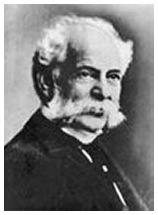

Henry John Heinz
Born: October 11, 1844
Place: Pittsburgh, Pennsylvania
Died: May 14, 1919
Place: Pittsburgh, Pennsylvania
 Henry John Heinz was born in Pittsburgh, Pennsylvania on October 11, 1844. His father emigrated from Bavaria in 1840, settled in Pittsburgh, and set himself up as a brick maker. Henry's mother, a German native, was also a recent arrival in this country. In 1850, Henry's father moved his family and the brick making business to Sharpsburg, Pennsylvania. The Sharpsburg home was comfortable and had a nice plot of land for a home garden. Young Henry was encouraged to try his hand at gardening, and he took a liking to producing fresh vegetables and roots. He was also a born entrepreneur. At the age of 12, Henry was selling produce from his family's garden. At first, he sold to local neighbors, and then he expanded his venture by selling directly to grocers. He kept his customers happy by being honest and always providing quality products.
Henry John Heinz was born in Pittsburgh, Pennsylvania on October 11, 1844. His father emigrated from Bavaria in 1840, settled in Pittsburgh, and set himself up as a brick maker. Henry's mother, a German native, was also a recent arrival in this country. In 1850, Henry's father moved his family and the brick making business to Sharpsburg, Pennsylvania. The Sharpsburg home was comfortable and had a nice plot of land for a home garden. Young Henry was encouraged to try his hand at gardening, and he took a liking to producing fresh vegetables and roots. He was also a born entrepreneur. At the age of 12, Henry was selling produce from his family's garden. At first, he sold to local neighbors, and then he expanded his venture by selling directly to grocers. He kept his customers happy by being honest and always providing quality products.
In 1869, at the age of 25, Henry John Heinz went into business with a neighbor, L. Clarence Noble. Their first product was grated horseradish, from Henry's mother's recipe. Canned and bottled products at this time were of varying quality, and some producers used colored bottles to mask the condition of their ingredients. Henry wanted his products to highlight their purity, so he bottled the horseradish in a clear glass bottle. The idea worked, and the Heinz & Noble business thrived for several years. They worked with lenders and increased their cultivation fields so they could expand the amount and variety of their produce. They added other high quality products to their line, including pickles, vinegar, and sauerkraut. They delivered their goods by horse-drawn wagons to Pittsburgh grocers, and became well-respected businessmen. At its height, the partnership boasted a hundred acres of cultivated land along the Allegheny River. But in 1875, the business floundered as a result of over-production and over-extension, and it fell into bankruptcy as the banks themselves collapsed.
Undaunted, Henry began again that same year, this time with a brother and cousin as business partners. Henry still believed in his idea of well-packaged, quality products. He knew that his horseradish, pickles, and vinegar were superior products, so he kept those and added more products to the line. His new company introduced tomato ketchup, which was very well received. Then he added more products, such as pepper sauces, olives, pickled cauliflower, pickled onions, mincemeat, mustard, baked beans, and soups. Each of these products had to meet Henry's high standards of quality, and Henry believed that for a finished product to be superior, you had to start with high quality ingredients. He also believed that production methods had to be clean and consistent. Further, he believed that his processing and packaging plants had to be manned by satisfied workers. Henry's factories were models of employee loyalty because of the way the company treated all its workers. In fact, Heinz was so adamant about the cleanliness of his facilities, and the well-being of his employees, that he invited people into his factories to see for themselves. It is said that H.J. Heinz invented the public factory tour.
Henry John Heinz also believed that the world was his marketplace. The H.J. Heinz Company and its products became known worldwide, in large part because of Henry's outstanding ability to market his products as superior products. He coined the term "57 Varieties", which is still used on some of the company's labeling today. His dedication to producing quality products, combined with his outstanding genius in the area of marketing, transformed the H.J. Heinz Company into one of the country's leading food condiment companies. It also resulted in Henry John Heinz reaching millionaire status by the time he was 52.
Henry John Heinz died on May 14, 1919, leaving the H.J. Heinz Company in the hands of his family. His son Howard was already overseeing much of the company's operations at the time of Henry's death. The H.J. Heinz brand that Henry John Heinz created still stands as a model of branding success and consumer confidence.
Author Nancy Koehn has recently published a fascinating book that looks at six entrepreneurs and the highly successful brands that they created.
Brand New: How Entrepreneurs Earned Consumers' Trust from Wedgewood to Dell explores the success of Josiah Wedgwood, Henry John Heinz, Marshall Field, Estee Lauder, Howard Schultz, and Michael Dell. Each of these entrepreneurs created a brand that gained widespread consumer trust. The author shows how each of these branding geniuses understood the social and economic changes of their times and how they were able to develop long-term relationships with their customers through their trusted brands. This very interesting and insightful book is available now through our association with Amazon.com by clicking
here.
|




